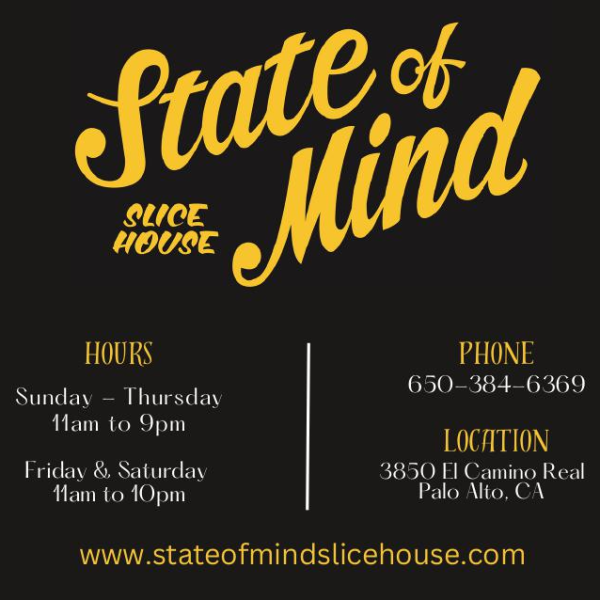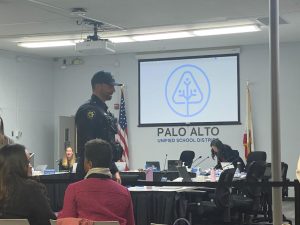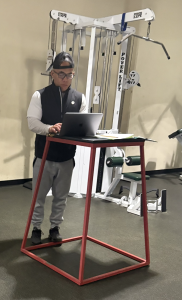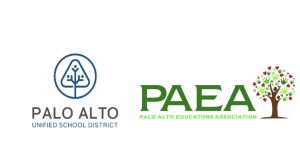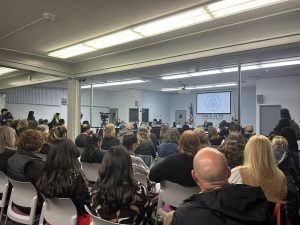Dyslexia, holistic grading and alternatives to suspension: Excerpts from our talk with Supt. Austin
August 27, 2019
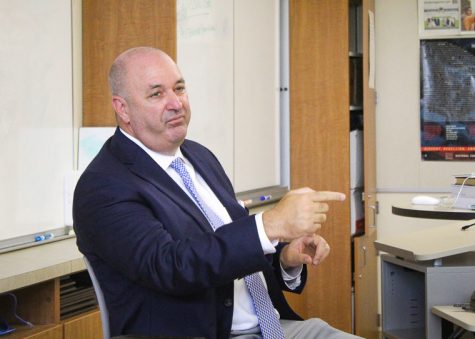
Last week, The Paly Voice was pleased to host a talk with Don Austin, the superintendent of Palo Alto Unified School District since the beginning of last year. Here are some important points that came up.
PV: In a recent article on Palo Alto Online, you mentioned you are interested in changing the way grades are done. Instead of letter grades, you wanted a more holistic view through evaluations. What would this look like? How and where do you plan to implement it and do you think teachers will be excited about this idea?
Austin: So I don’t see us in the short term shifting away from letter grades at all. What I said is that there is a bit of a new-way-versus-old-system-conflict that’s shaping up. The idea that a student should perform on one given assignment or test, be given a great judgment and moved along to the next thing, minute idea or methodology — that’s going to phase out over time. And we’re starting to see some good work, especially at the middle school levels of transitioning more to standards-based grading. The idea here is, I’m going to hope that most of you are not going to write a story for one of the publications here, write it one time, turn it in, have it published, without any revisions, or anyone looking at or helping you or giving you any feedback, right? If you did, our publications would not look like they do here. So the idea is that you make something better, and you get better in learning from feedback, and the ability to go back and revise and try again. That’s where this movement’s going. And I think when you look at your college and career readiness all the time and where people misinterpret that to me is we’re getting you ready to go to college. Well, okay, but the part they always forget about is career. And career doesn’t mean that we’re getting you ready to go from high school into a job. Okay, it’s not like a work program. But it’s what attributes. Do you have to have to be successful in a job whenever you get to a job, maybe that’s after years of college? I would always say showing up, being on time. But the other is taking feedback, revising, making things better, making your peers better, making yourself better. So why wouldn’t we start doing that here in school? And we give you a test in a math class, it has 20 questions, and you missed 10 of them. And of those 10 seven are clumped in a theme. Do we need to give you a letter grade say yep, you didn’t get that? Okay, here we go. Next thing? Would it make sense to go back and say, hmm, maybe not only did you need some extra help in this theme, but maybe the whole class needed help in this theme. And you go back and you think grades. Grades serve a purpose. But if the purpose stops at judgment, we’ve fallen short.
PV: In the 2019-2020 plan, a goal that stood out was identifying and implementing restorative practices, and other alternatives to suspension. What exactly does that mean, and what would the alternatives to suspensions be?
Austin: So if we go back to core beliefs, our core beliefs are pretty simple. Those things that just don’t change over time. And one is, if our schools are great, and I think they are, if our teachers are great, we think they are, then every day a student isn’t with that teacher in our schools is a day missed. And if you’re being taken out of class, for something that there’s another way to address, that’s us taking you out of the opportunity for you to be receiving great instruction in our awesome schools. Restorative practice is where it gets tricky. Some people hear restorative practices and they immediately go to, that’s fine, there’s no discipline anymore, kids can do whatever they want. And that is totally not what restorative practices are. We have trainings heavily attended by our elementary school teachers called responsive classes, responsible classrooms. And they teach teachers, when they see certain behaviors from students, how they can work with that student right there in the moment in the class. If you’re an elementary school student, and you have a hard time sitting in your chair, there’s a chance that an old system you just be sent out of the classroom because you’re distracting. Right? Well, now I’m talking to elementary school teachers and trying to get some pilots to say, well, maybe that student needs a stand-up desk. Right? Because is the fact that the student can’t sit willful defiance, or does that student just need to stand? One of my three kids, my little daughter, she can’t sit still. Right? She’s 21. So she in school would always be the kid that, you know, in her seat she would always have one knee on the seat, another one on the ground and she’s doing this and biting her pencil. Does that need to be a student gets kicked out of class? Or can we just address it differently? So for Responsive Classroom training is really important. Of course, people’s minds go to wherever they are. If you’re in high school and you’re saying something threatening to a teacher, classmate, that doesn’t mean we’re going to ignore that we’re going to try to change that behavior and take strong measures. But a lot of things don’t rise to that level.
PV: According to the 19-20 plan, there is a goal to start investing $38,000 in students with dyslexia. How will you ensure that the money actually addresses the specific needs of special needs students?
Austin: The statistics are semi-true or in the ballpark of 20% of students will have some version of dyslexia, which impacts your ability to read and comprehend. Twenty percent is a big percentage. So, we’re screening every K-3 student. If you hit a certain score on the pre-screening, then you go to the next level of screening so we can get you the help that you need. That’s a huge, huge difference. Imagine this if you’re seeing words differently and people are just interpreting that as ‘this student just can’t read’, and we’re having a hard time teaching them. And you’re trying to teach them reading skills without understanding that it’s not the reading skill. It’s that they can’t read the words the same way we see them. That’s a big disconnect and we’re giving them the wrong help. So now we know that we’re going to get students the help they need earlier and more accurately. That’s the single biggest change.




